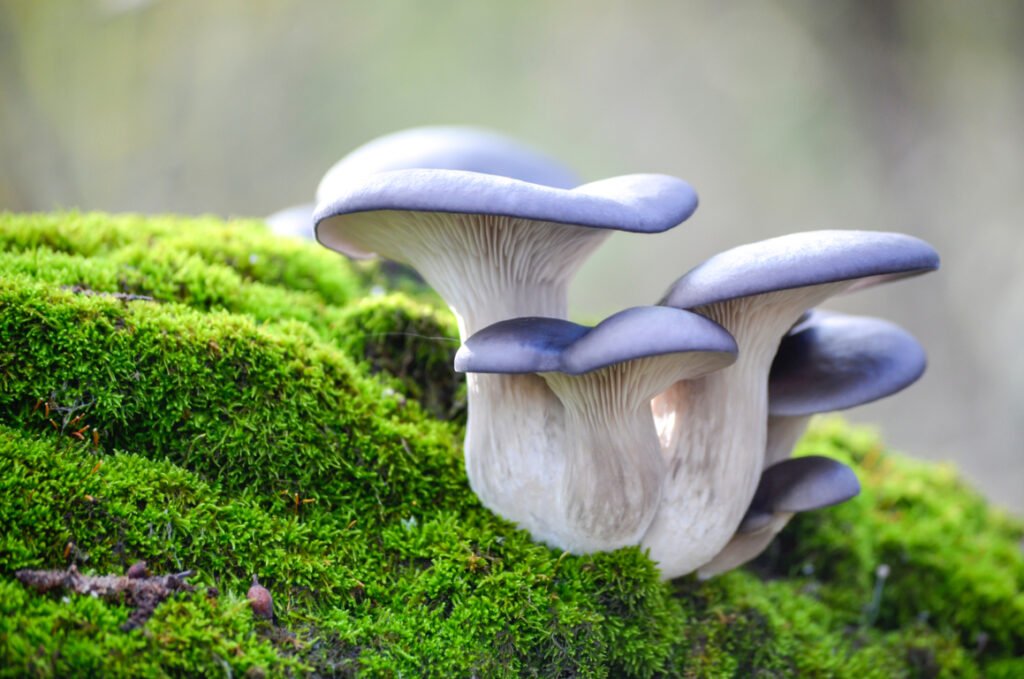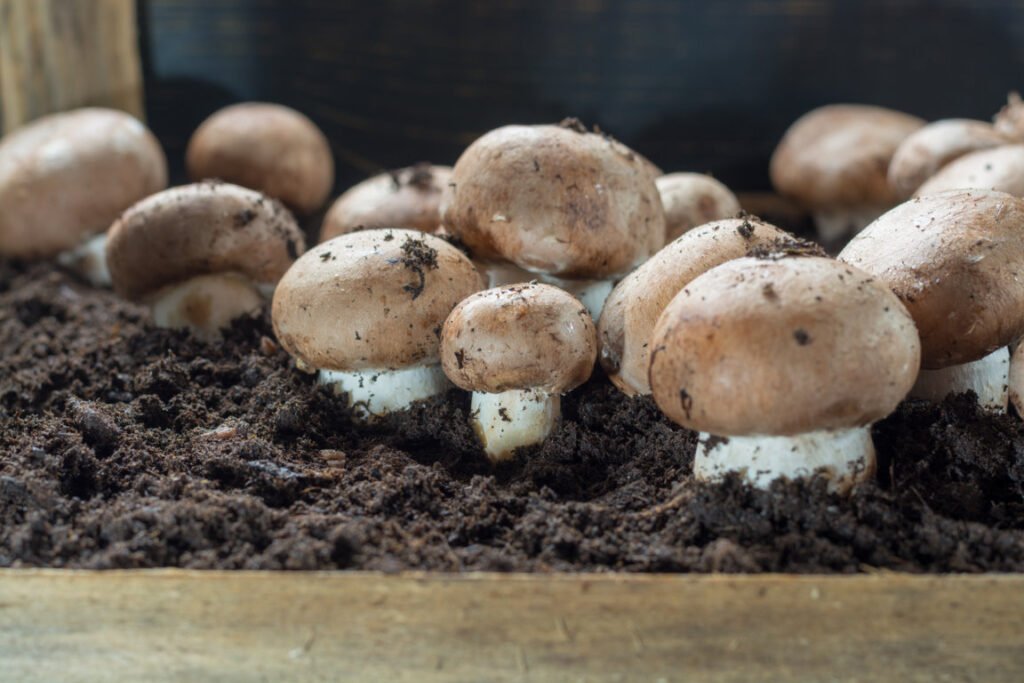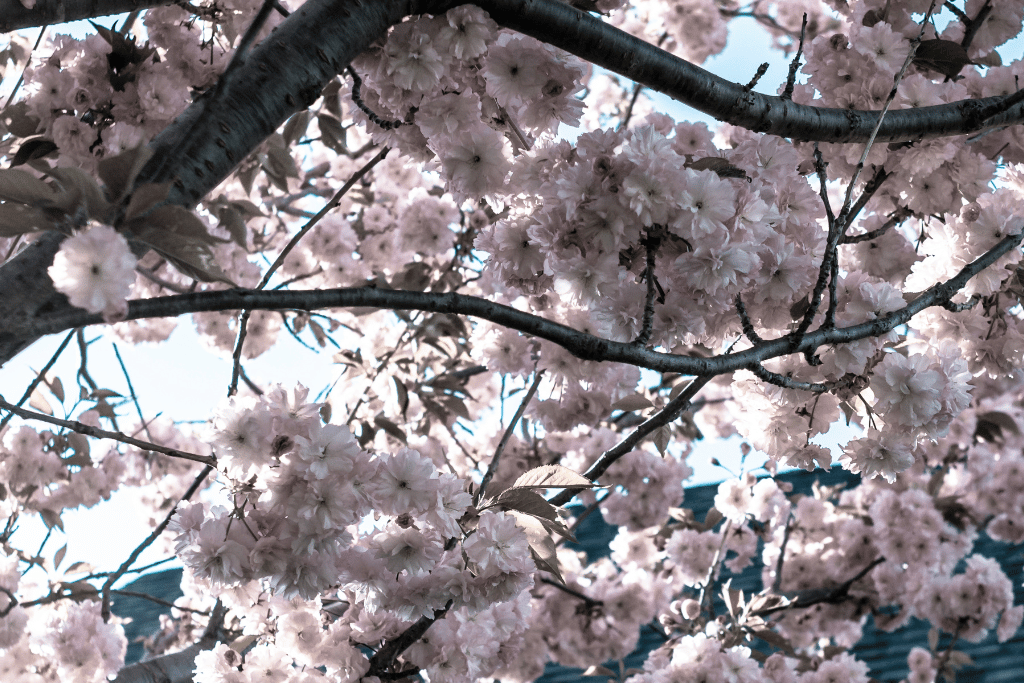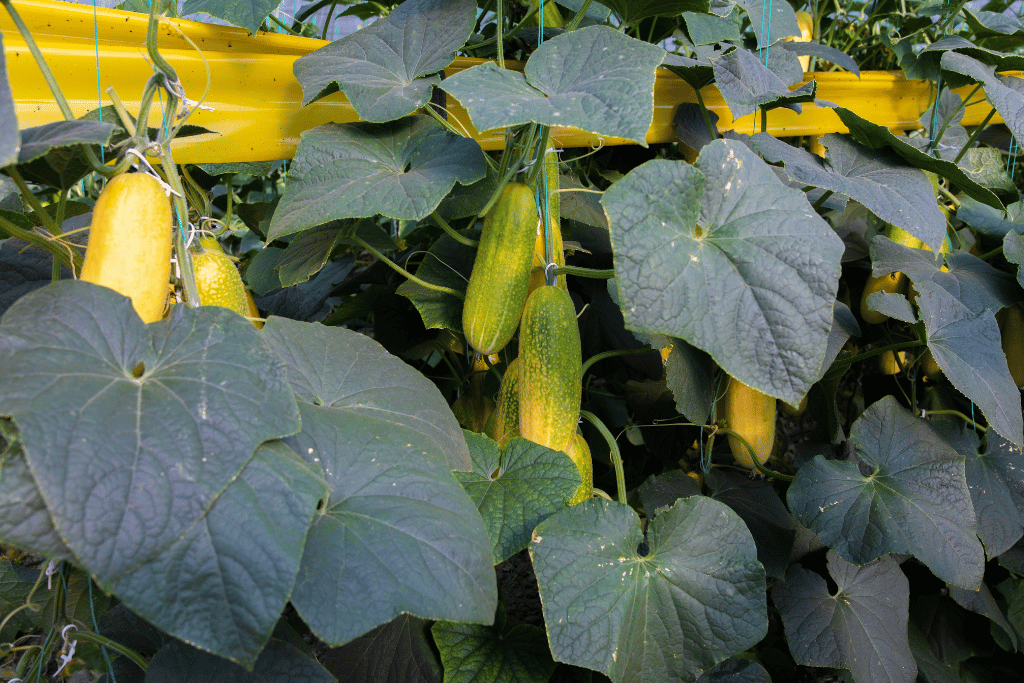No matter how green your thumb may be, there will come a point when something strange will grow in your garden, and for most of us, the first occurrence of that “something strange” is usually mushrooms.
Mushrooms in your garden might look like an intruder, but don’t fret just yet! Depending on the type of mushroom and the environment of your garden, it could be perfectly normal for mushrooms to grow in raised beds.
Keep on reading if you want to know if mushrooms growing in your raised bed are an attack on your garden or something normal!
First up, Let’s Talk About What Mushrooms Are!

Mushrooms are an incredibly diverse form of fungi, with over 14,000 species currently known globally. There is a huge range of shapes and sizes to be found, from the tiny brown chanterelle to the large white morel.
Depending on the species, they may appear in groups or on their own as lonesome shroom-fellows.
You see, mushrooms are a great source of nutrition, often rich in vitamins, minerals, and antioxidants.
They can be enjoyed cooked or raw, depending on the variety, and provide an interesting texture to dishes.
However, it is important to be careful when it comes to mushrooms. Some species are toxic, and even edible ones can contain toxins in certain conditions.
So let’s just say it’s always best to stick with mushrooms from reliable sources if you plan on consuming them. I.e.: Maybe not the ones that just pop up in your garden?
But in general, not only are mushrooms a delicious food source, the mushroom is incredibly beneficial for the environment. Mycelium networks create channels for water, minerals, and organic matter to travel through the soil. This helps promote healthy plant growth and builds a strong network of underground life. They’re even being used in sustainable building materials to increase their insulation value!
But most of the time, all of the above benefits apply to the mushrooms that are grown on purpose.
So, Why are Mushrooms Growing in My Raised Bed?
That might be a question you’ve asked yourself every time you’ve been a rouge mushroom appear in your raised bed.
And well, we don’t blame you.
It’s a strange sight to see. But the thing is, you might’ve accidentally given it an invitation without even realizing it!
Let’s take a closer look at some of the main reasons why mushrooms might be growing in your raised bed!
Raised beds are adequately hydrated
There are almost always adequate hydration levels in a raised bed, and the soil is usually rich in organic matter, making it a prime environment for mushrooms to thrive.
Since Mushrooms are part of the fungi family, which grows and survives mainly off decomposing organic matter, they feel right at home!
So if you have plenty of mulch, compost, or decaying leaves in your raised bed, then chances are they’re being used as food for the fungi to grow.
There’s plenty of shade
If you have raised garden beds, it’s likely that some areas will be shaded for a portion of the day.
That ends up being great news for mushrooms, as they thrive in such moist, shady spots.
The shade, combined with the hydration, makes it very easy for these guys to make themselves right at home!
Warmth and Humidity
The warm, humid environment of a raised bed is also a great breeding ground for mushrooms. You see, as opposed to a traditional garden, raised beds are smaller, and it’s easier to warm up the entire thing quicker. So a couple of hours of sunlight and you’ve got a pretty warm area just waiting for mushrooms to start growing!
When temperatures reach between 59-86 degrees Fahrenheit, it’s even more likely for them to pop up in your garden!
Organic material galore
Mushrooms tend to thrive in organic material in various stages of decomposition.
From the old tree stumps or worn-out fences that you may find them exploding from, to the wooden chips, chunky mulch, and timbers used to construct raised garden beds, they all provide an excellent habitat for mushrooms to proliferate.
Thus, if you have any of these materials lying around your garden, expect to find mushrooms!
Is It Okay That Mushrooms Started Growing in My Raised Bed Garden?

Having mushrooms in your raised bed has a myriad of benefits.
For starters, the mycelium networks that develop can help plants access important nutrients like nitrogen, potassium, and phosphorus more easily. These are the key to enabling plant-to-plant communication.
Fungal networks also help break down complex chunks of organic matter into smaller pieces that can be more easily absorbed by the soil. In turn, improving its quality overall.
In addition to all of that, mushrooms themselves don’t require a lot of nutrients to survive. Instead, they add nutrients to the soil when they decompose.
Mushrooms are also an excellent source of organic matter as well as a great way to add diversity to your garden’s ecosystem.
The mycelium networks that mushroom growth creates can help plants better access water, while providing aeration and drainage for the soil as well.
So forget about the overwatering and root rot worries; the mushrooms could just take care of everything for you!
By allowing mushrooms to grow in your raised bed, you can also benefit from their natural fungicidal properties.
Mushrooms produce various compounds that are toxic to certain pests and disease-causing microorganisms, making them an effective form of pest control.
These natural fungicides can be a great way to keep your garden healthy without having to use harsh chemicals.
If all of that wasn’t great enough on its own, mushrooms can also be a great source of food and medicine for both people and animals.
Lots of different types of edible mushrooms are known to have powerful antiviral, antibacterial, anti-inflammatory, and antioxidant properties, making them a valuable addition to any home remedy kit.
So, if you’re looking for an easy way to add beneficial diversity and health to your raised bed, consider allowing mushrooms to grow in it.
While there is still much that we don’t know about the exact role mushrooms play in a garden ecosystem, they are undeniably one of nature’s most versatile organisms and can provide numerous benefits.
But things can’t be all good, can they?
Should I Be Worried About Mushrooms Growing in My Raised Bed?
Let’s get real.
Mushrooms weren’t always known for being these great things for gardens. In fact, most of the world knows them as pests you should get rid of!
But knowing the benefits above, should you really be worried about mushrooms growing in your garden?
If so, when?
Time to discuss that.
The first instance where you really don’t want mushrooms to be growing in your raised bed is if they’re poisonous.
Poisonous mushrooms can be a real issue if they are growing in a raised bed that’s full of other edible crops.
The good thing is that the species of mushrooms that are most likely to start randomly growing in raised beds are more likely to be harmless than toxic.
Nevertheless, if you have any doubts whatsoever, it’s better to be safe than sorry.
The other instance you should pay special attention to is if you have small children or furry ones (pets) around the house.
If either of them has access to your garden, not keeping a close eye on them can be quite dangerous.
When it comes to little ones, they may find mushrooms irresistible and decide to get too close to them.
It only takes these guys about a second to put things in their mouths, so it’s best to remove any mushroom that could attract their attention and keep them as safe as possible!
It’s also important to ensure your mushrooms are the kind you want.
Though most of the time, they’re good for your garden, some mushrooms can be parasitic and actually harm the plants in your raised bed.
If these appear, you may want to remove them as soon as possible.
How to Stop Mushrooms From Growing in My Raised Garden Bed?
As we’ve gone over earlier on in the article, while mushrooms are usually fine to have in your garden, there may be times you just don’t want them around.
If that’s something you’ve chosen, there are lots of ways you can go about it!
Let’s take a look at some of the best ways to stop mushrooms from growing in your raised garden bed!
Use fully decomposed compost
If you have a raised bed in your garden and find mushrooms growing in it, there are some steps you can take to help prevent this.
One of the most important things is to use fully decomposed organic material as mulch or fertilizer when possible.
This means using mature compost or manure rather than freshly collected materials which may still be decomposing and creating heat and humidity – the ideal conditions for mushrooms.
Reduce the moisture
Another way to reduce the chances of mushrooms growing in your raised bed is to avoid having too much moisture in the raised beds.
This doesn’t mean that your soil should be completely dry, but rather that it shouldn’t be overly wet either.
You may want to add some gravel or perlite to the soil in order to help promote drainage and reduce the amount of moisture in the bed.
That way, you’ll remove one of the primary things that mushrooms need to grow, and with it, you should naturally see a decrease, even if they don’t disappear entirely.
Keep things super clean.
Regularly cleaning and tidying your garden beds is also a good way of keeping fungal growth under control.
Remove any dead leaves or other debris, as this can provide a food source for the fungi.
If mushrooms are already growing in your raised bed, try to remove them and dispose of them away from the garden so they can’t provide the environment for replacement mushrooms to grow there instead!
Let there be light
You can also reduce the amount of shade in your garden, which can help to reduce the chances of fungi growing in your raised bed.
If you have trees or shrubs near your beds, try to prune them to allow more light into the area. The more light the area receives, the less hospitable it will be for fungi and mushrooms.
Bring in the big guns
If you’re really serious about preventing mushrooms from growing in your raised bed, you may want to consider using a fungicide.
Fungicides are chemical compounds that kill fungi, including mushrooms.
These products come in a variety of forms, such as sprays and powders, and have to be applied according to the manufacturer’s instructions.
Make sure you wear protective gear when applying fungicide—it is a powerful chemical and can cause serious harm if not used properly.
Remember that fungicides will only control existing mushrooms, not prevent them from growing in the future.
So, it’s important to make sure that your soil is amended with organic matter and kept moist to discourage new mushroom growth.
Finally, How to Remove Mushrooms from Raised Garden Beds
The safest and most effective way to remove mushrooms from your raised garden beds is to scoop up the soil around the mushrooms with a shovel and shift it to another part of your garden.
This can help reduce the spread of spores and prevent any further growth in that area.
If you choose to use chemicals, such as fungicides or herbicides, make sure they are safe for edible plants.
Many chemical sprays may kill mushrooms, but they can also damage other plants in your garden.
Finally, you can use a thick layer of mulch or cover the soil with plastic to prevent mushrooms from growing back.
This works best when used in conjunction with manual removal, as it will help stop any further spores from spreading. Plus, the mulch or plastic material will help add essential nutrients to the soil and stop mushrooms growing in raised garden bed immediately!
The Bottom Line
While seeing mushrooms growing in raised beds unexpectedly can be pretty shocking, it’s not actually bad for your gardens most of the time.
So it is perfectly fine to let them be. However, if you’re starting to worry if the mushrooms may be poisonous, or simply don’t like the look of them being in your raised garden beds, that’s okay too! You can always remove them using the tips we’ve outlined in the article will help you annihilate them and have your garden back, exactly how you’d want it to be!



